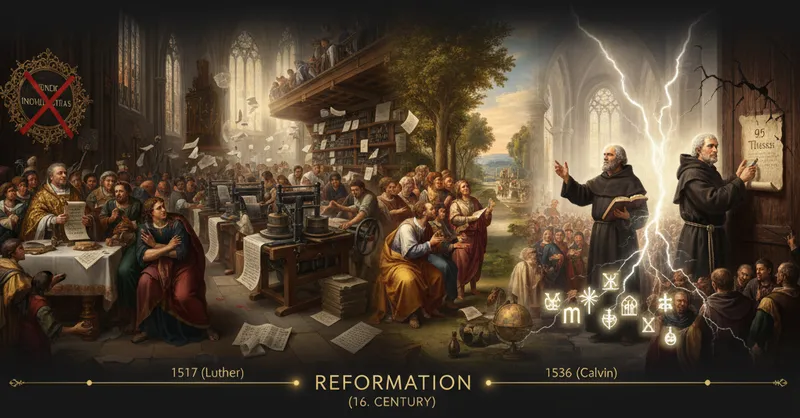
What is the Reformation? Why was this religious revolution, which fractured the Catholic Church and led to the birth of new denominations at the beginning of the 16th century, necessary? How did the Church’s sale of Indulgences, the invention of the Printing Press, and the critical environment of the Renaissance set the stage for the Reformation? What roles did Martin Luther and Calvin assume as pioneers of this movement?
⛪ THE REFORMATION (EUROPE’S RELIGIOUS AWAKENING)
The Reformation is the name given to the religious revolutions that took place in Europe at the beginning of the 16th century. The Reformation fractured the Catholic Church, which had been the sole religious organization in Europe until the beginning of that century, and led to the birth of new churches and denominations.
Causes of the Reformation
The fundamental causes that led to the Reformation movement are the corruption of the church and social awakening:
- Corruption of the Church: Popes and priests were misusing their authority. In order to earn more money, they began issuing and selling a pardon certificate called Indulgences.
- The Invention of the Printing Press: Thanks to this great invention, the printing and selling of religious books such as the Bible and the Torah ultimately awakened the public, who realized that the clergy were deceiving them.
- The Renaissance and Discoveries: The critical environment brought about by the Renaissance and the development in Europe following the Age of Exploration were other important factors that enabled the birth of the Reformation.
Luther and Protestantism
- Pioneer: The Reformation was first initiated in Germany by a peasant’s son named Martin Luther. Luther, a priest who had studied law, knew the church was corrupt and laid the foundations of the Protestant denomination by putting forth new ideas.
- Calvin: Calvin, who is considered the pioneer of the reformation in France and the founder of Calvinism, is also one of the important figures of this movement.

Leave a Comment